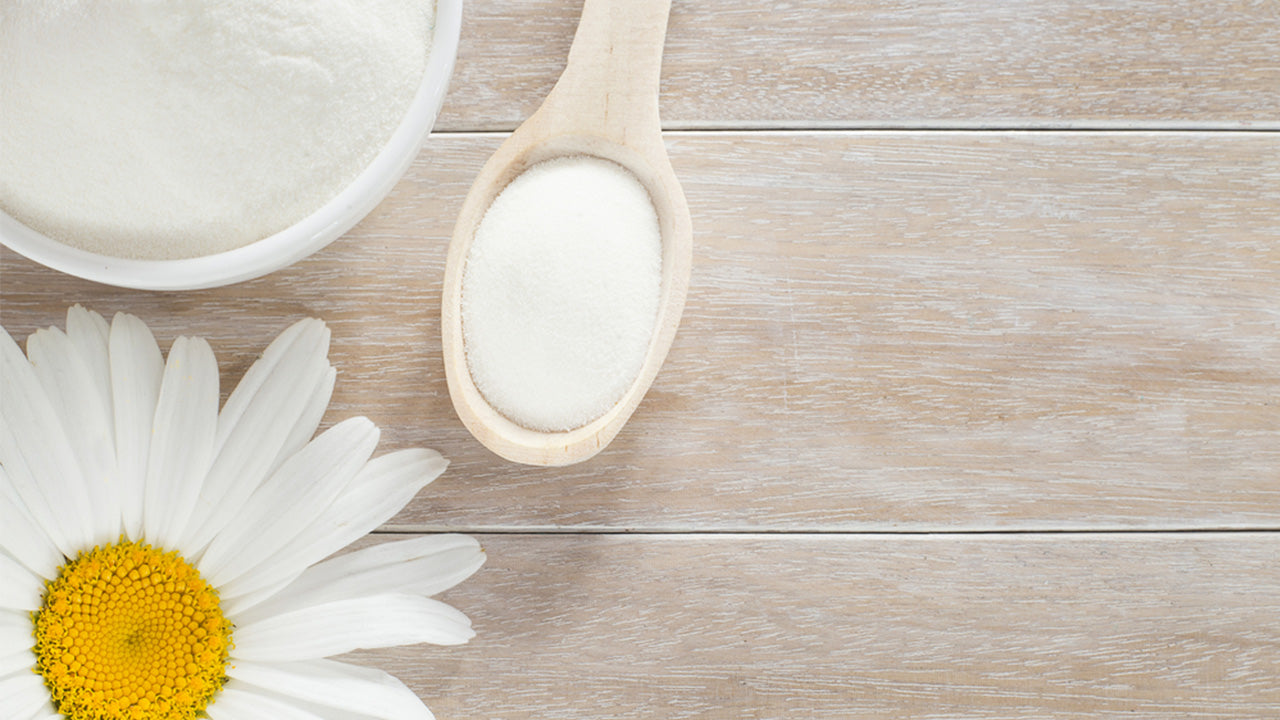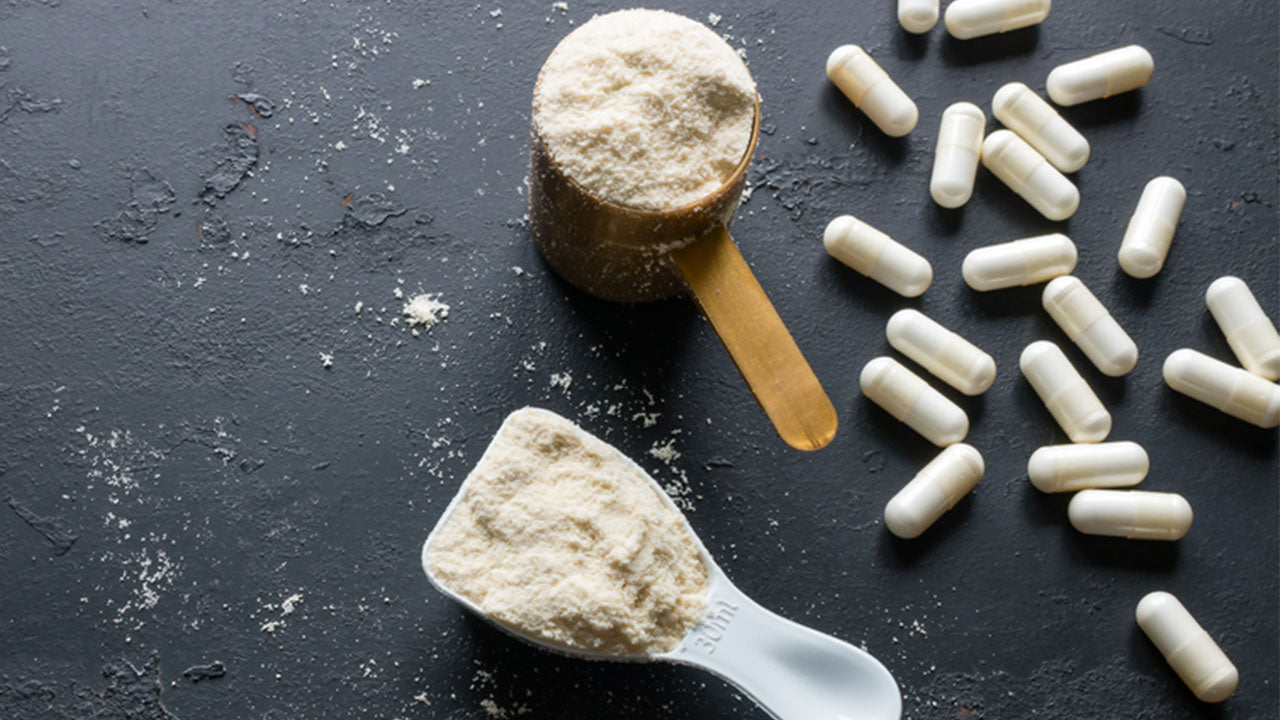Collagen Amino Acids: Where They Come From and How They Work
 By: by Amino Science
By: by Amino Science

Collagen has become synonymous with youthful skin. To go further than skin-deep when it comes to what this protein is and does, read on for details about your collagen amino acids, as well as the various types of collagen supplements and how they work.
What Is Collagen?
First things first: collagen is the most abundant protein in our bodies, making up a solid 30% of all the protein we contain. It's also 70% of our skin's protein, which makes collagen the main structural protein present in our skin, but it's in our other connective tissues too (muscles, bones, and tendons).
Certain types of collagen fibrils are stronger than steel, while other collagen molecules keep our skin supple, and are sometimes used in medical wound dressings to draw new skin cells to the area. Our collagen production declines as we age, which leads to (among other things) signs of aging like wrinkles and a loss of skin elasticity. This is why collagen is often applied in cosmetic and dermatological treatments.
There is collagen in your hair, your nails, and the ligaments that string the human body together. It's collagen that allows us to bend and stretch, and it's collagen that makes the difference between a strong, glowing outer appearance and a brittle, faded facade. Long story short: collagen is important, so what makes up collagen, and how can we be sure we're getting enough of those ingredients?
What Is Collagen Made Of?
Collagen is made up of amino acids, which are known as the building blocks of all proteins. Actually, there's one term in between you should know about: collagens are classified as peptides due to their amino acid composition. To understand the terminology:
- Peptides: Compounds that consist of at least 2 amino acids.
- Polypeptides: Polypeptide chains consist of 10 or more amino acids.
- Proteins: Peptides that consist of 50+ amino acids.
So, as all squares are rectangles but not all rectangles are squares, all proteins are peptides, but not all peptides have enough amino acids to be called proteins. Collagen is a peptide because it has between 2 and 10 amino acids.
What amino acids are in collagen? There are four different amino acids that make up the structure of collagen.
- Arginine: Also known as the "anti-aging" amino acid, this semi-essential amino acid is a constituent of most body proteins.
- Glycine: The simplest naturally occurring amino acid and the second most common one we have, glycine makes up a third of our overall collagen supply.
- Proline: Proline is responsible for the production of cartilage and the collagen that benefits wound healing and heart health.
- Hydroxyproline: An amino acid derivative made from proline and lysine, hydroxyproline makes up about 13.5% of fibrillar collagens.
These are classified as nonessential amino acids: because they can be synthesized within our bodies, we don't vitally need to get them from outside sources. However, some people want more collagen than their bodies naturally produce, especially once the damage done by environmental factors, UV light, and aging slow down production. Our skin gets weaker, our joints get stiffer, and our nails, hair, and bones get more brittle. For more on sources of collagen and collagen supplements, read on.

Collagen Amino Acids: Where Do They Come From?
The question now is: how do you get more of these amino acids so important for the formation of collagen? There are two ways, either from dietary sources or from collagen protein supplements. Let's start with dietary sources.
Dietary Support of Collagen Amino Acids
1. Bone Broth
Bone broth is made by simmering animal bones to extract the collagen from them and their connective tissues. Because bones are full of other nutrients like calcium, magnesium, and phosphorous, people consume bone broth in the hopes of ingesting these minerals along with the relevant amino acids, though the science is a little shaky on this topic.
2. Chicken and Egg Whites
Many collagen supplements are derived from chicken because of the abundance of connective tissue in poultry. Studies have shown that neck and cartilage tissue from chickens may have application in collagen treatments for the signs of aging.
While chicken eggs don't have connective tissue, the whites of eggs are full of proline, one of the four necessary ingredients for collagen synthesis.
3. Fish and Shellfish
Just like in land animals, fish bones and shellfish ligaments are made out of collagen, and marine collagen is a particularly popular form of collagen supplement because of its potentially higher absorbability. Though we tend not to eat the bones and tendons of fish (let alone the scales and eyes where collagen peptides are most concentrated), fish skin is nevertheless studied for its potential aid in collagen production.
4. Citrus Fruits and Dark Berries
Fruits and berries make the cut due to vitamin C's role in stimulating collagen synthesis. Though they don't give the key ingredients for collagen, they do provide the means to make it. These foods include lemons, limes, grapefruit, and oranges, plus raspberries, blackberries, and blueberries.
5. Beans
This plant protein source can provide many of the amino acids needed for protein synthesis, including those used in collagen formation. Beans also provide your body with copper, another nutrient (like vitamin C) needed for collagen production.
Supplemental Support of Collagen Amino Acids
If you're thinking about supplementing with collagen powders, here are some quick tips:
- Make sure the product says it contains hydrolyzed collagen or collagen peptides—hydrolyzed means the collagen is already partially broken down, increasing its bioavailability during digestion.
- Look for proline, glycine, and hydroxyproline specifically listed on the label.
- Choose sustainably sourced products from either wild-caught fish or grass-fed cows.
- Avoid added dyes, flavors, or preservatives and instead opt for 100% pure collagen.
A good collagen supplement could provide you with the following scientifically proven benefits.
1. Improved Skin Health
Skin care studies have revealed that supplemental collagen peptides may help slow aging, reducing skin dryness and the presence of wrinkles. Collagen supplementation may also boost the production of elastin and fibrillin, two other proteins important for healthy skin.
2. Bone Loss Prevention
As bones are made of collagen, maintaining a strong collagen supply will help protect them. The collagen deterioration in bones due to aging could lead to the development of osteoporosis, while collagen supplements and treatments have been shown to inhibit bone breakdown and loss. One year-long study of women taking collagen supplements (5 grams per day) for a year found that those consuming collagen had up to a 7% increase in bone mineral density than the control group.
3. Promotion of Joint Health
The loss of collagen in your joints can lead to degenerative conditions like osteoarthritis. There are studies that have found collagen supplementation may improve osteoarthritis symptoms and relieve overall joint pain. In a 2008 study on athletes with activity-related joint pain, those who consumed 10 grams of collagen each day over 24 weeks reported a significant joint pain decrease over the control group. For the young and the old, collagen can improve joint function.
4. Enhanced Heart Health
Collagen provides the structure for your arterial walls and blood vessels, and without it your arteries could weaken, contributing to the risk of suffering from atherosclerosis and heart attack. In one 2017 study on atherosclerosis in healthy human adults, consuming 16 grams of collagen per day over 6 months resulted in notable reductions of arterial stiffness. They also happened to see an increase in "good" HDL cholesterol levels by 6%.
5. Increased Muscle Mass
Around 10% of your muscle tissue is made up of collagen, and collagen supplements may help increase muscle mass in those with sarcopenia, which is a decrease of muscle mass due to age-related loss. This 2015 study of elderly men showed that 15 grams of collagen taken alongside a 12-week daily exercise program led to significantly more muscle mass and strength than what was gained by the control group.
Calling All Collagen
For a good portion of our lives, we are able to generate the type of collagen production that keeps us youthful. After that, our bodies need more help in new collagen creation. Making sure you have sufficient amino acid supplies to make the collagen you need is step one in fighting aging and maintaining healthy skin, muscles, bones, and joints.

Up to 25% off Amino
Shop NowTAGS: knowledge
Join the Community
Comments (0)
Most Craveable Recipes




 833-264-6620
833-264-6620



















